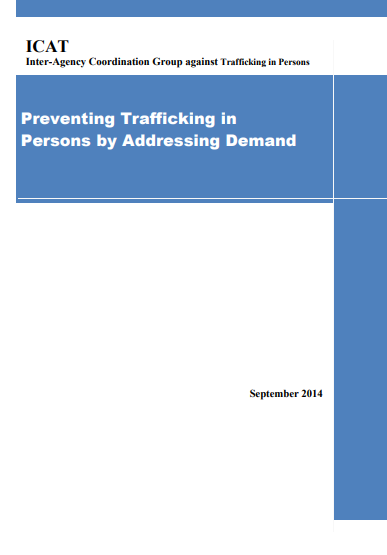The Inter-Agency Coordination Group against Trafficking in Persons (ICAT) was set up in 2007 in response to a United Nations Economic and Social Council (ECOSOC) resolution in 2006 (2006/27) requesting intergovernmental agencies to work together to strengthen technical assistance provided to countries in the area of human trafficking. A resolution of the UN General Assembly in March 2007 confirmed the importance of eliminating “gaps and overlaps” in the anti-trafficking efforts of intergovernmental agencies and requested the UN Secretary-General to develop interagency coordination further in order “to enhance cooperation and coordination and facilitate a holistic and comprehensive approach by the international community to the problem of trafficking in persons” (A/RES/61/180). As a policy forum, ICAT aims to facilitate a holistic and comprehensive approach by the international community to preventing and combating trafficking in persons including protection and support of victims of trafficking.
In response to this mandate, ICAT is committed to publishing a series of five issue papers, each examining one key issue that has been identified and agreed by ICAT’s member organisations as a critical challenge to address for the international community to succeed in the fight against trafficking in persons in the coming decade. The planned series of ICAT papers provides an opportunity for international organizations to speak with one voice and is intended to serve as a catalyst for the promotion of common strategic priorities and greater policy and programmatic coherence.
An overview paper titled, The next decade: Promoting common priorities and greater coherence in the fight against human trafficking, covering the summary of the five themes was launched in May 2012 in New York at an event hosted by ICAT and cosponsored by the Mission of Sweden together with the Association of South East Asian Nations (ASEAN). The first issue paper of the series, titled the International Legal Frameworks concerning Trafficking in Persons, was published in 2013.
The second issue paper, titled Preventing trafficking in persons by addressing demand, is the result of inter-agency teamwork benefiting from the extensive experience of the members of the ICAT Working Group, comprising ILO, IOM, OHCHR, UNHCR, UNICEF and UNODC, coming together to contribute in a collegial manner their experiences and institutional expertise in the advancement of a common cause – to enhance coherence in addressing the issue of human trafficking.
Introduction
During the first decade following the adoption of the UN Trafficking in Persons Protocol, most efforts to prevent trafficking in persons (TIP) focused on what is often referred to as the supply side, concentrating on those who were seen as vulnerable to becoming victims of trafficking in person. Partly as a result of a perceived lack of progress for such supply side interventions, recent years have seen an increased interest in identifying and addressing factors that contribute to the demand that fosters all forms of labour exploitation. One of the ways in which this demand is met, is through trafficking in persons, which this paper aims to explore.
This paper’s purpose is to provide guidance to organizations and practitioners by mapping out the dimensions of this demand as it relates specifically to trafficking in persons for labour exploitation, as well as highlighting strategies that can be used to address this aspect of the problem. The paper proceeds to identify concrete steps that can be taken by different actors to effectively reduce this demand.
This paper concentrates specifically on demand that contributes to trafficking for labour exploitation in the context of the production of goods and/or services. The paper thus excludes trafficking for other purposes (including forced marriage, begging, forced criminality and organ removal), each of which has particular nuances. The paper further does not address demand that contributes to trafficking for the purpose of sexual exploitation. The paper does however make frequent reference to forced labour. While forced labour and trafficking for labour exploitation are not fully synonymous – not all forced labour involves trafficking and not all trafficking for labour exploitation amounts to forced labour – they both result from similar demand factors. Further, many relevant initiatives against exploitative labour practices are framed in terms of forced labour rather than trafficking in persons.
The paper is divided into three parts. Part I provides an introduction to the concept of demand in the context of trafficking in persons for labour exploitation, the international legal framework relating to demand, and the reasons for increased attention to this area. The aim is not to create a definitive definition of demand but rather to identify an overall framework for Part II of the paper. This identifies different strategies and approaches for addressing demand and includes suggestions on possible steps to be taken with regard to each strategy. Part III consists of concluding comments, incorporating a brief summary of main recommendations.

